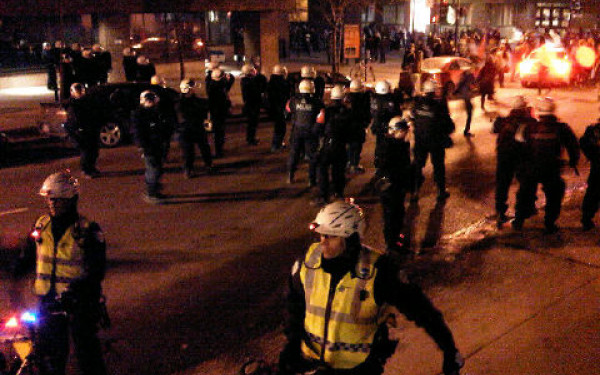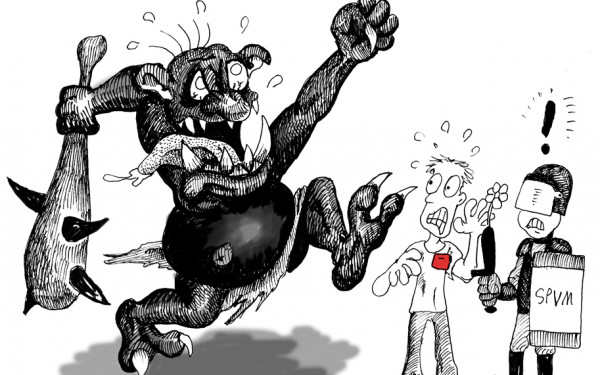Oil Rich or Dirt Poor
The Real Reasons Behind Venezuela’s Student Protests
Imagine for a second that you lived in a city plagued by violent crime.
In this city, the likelihood of being kidnapped, robbed or murdered is ever present. You can’t be outside your house after dark. You always have to be looking over your shoulder, just to make sure you’re not being followed. And even then, there’s always that chance you might be robbed while stuck in traffic or at the movies.
As if that wasn’t enough, add war-like living conditions: constant food shortages, frequent power outages, busted water services and an absolute lack of toilet paper.
If this sounds like something straight out of a horror movie to you, then bear with me, because what I’ve just described was my normal day-to-day life living in Caracas, Venezuela.
Don’t believe me? The Venezuelan Violence Observatory, an independent organization, reported there were about 25,000 violent deaths in Venezuela in 2013, while the country’s inflation rate topped 58 per cent in December.
By comparison, nearly 9,000 Iraqis died last year according to the United Nations—one of the bloodiest years since the Iraq War started—while the country’s inflation rate was 2.7 per cent heading into January.
Politically, the situation fares little better. The legacy of the late Hugo Chávez is one of immense corruption, coupled with state intervention in all public affairs and shortsighted economic planning.
His successor, former bus driver and union activist Nicolas Maduro, has only worsened this situation, the main difference being that Maduro lacks the charisma that Chavez used to cover his bad decision-making.
However, I won’t try to describe the entire Venezuelan political scene here. To do so would be to plagiarize George Orwell’s 1984.
In Venezuela, people are finally fed up with the deplorable living conditions. There is the widespread feeling that the country’s current political system has long expired and no longer represents the interests and aspirations of Venezuelans. The main group taking these concerns to the streets and protesting are university students, just like you and I.
Nationwide protests started on Feb. 12 and have continued day and night since then. However, even before that, students in other parts of the country were holding protests sporadically—Táchira, a Venezuelan state close to the Colombian border, was the first to begin the protests and has since become the centre of the protests’s most intense activity.
The student-led protests being held across the country are inherently peaceful, but government response to these demonstrations was not what you might expect. On Feb. 12, the afternoon of the first protests in Caracas, two students were shot dead by members of the Bolivarian Intelligence Service while marching towards the downtown area.
The National Guard was also called to control protests around the country that same day, leading to reports from Venezuelan newspaper El Universal of over a hundred protesters imprisoned and a dozen missing students. Armed militia groups, loyal to the current government and members of the ruling party, also responded to the protests by shooting live rounds at students they perceived as a threat to national security.
Meanwhile, President Maduro has done very little to actually calm the situation and prevent bloodshed. He has stated that the protesters are “fascist groups in pursuit of a political crisis in the country,” who wish to rob people of their peaceful lives, but simultaneously calls for peace and understanding between both parties.
Nevertheless, the government issued an arrest warrant for Leopoldo López, the opposition leader who has been calling for continued peaceful demonstrations. López, a Harvard graduate and former presidential candidate, was arrested on charges of terrorism, murder and inciting anti-government protests. He is being formally charged with arson and conspiracy and could face up to 10 years in jail.
López presented himself to authorities on Feb. 18, but his detainment has not calmed the situation. In fact, it has quickly deteriorated since.
On the eve of Feb. 19, during a nighttime demonstration in all major Venezuelan cities, protesters saw a combined attack of the National Guard, national police and armed militias.
What was particularly heinous about this episode was the violation of private property: as protesters sought refuge in homes of nearby residents, state security forces invaded apartments—without a warrant—to find protesters and drag them out. Reports of systematic torture of the detainees have been widespread.
At this point, you might be asking yourself how it’s possible that this has not been extensively covered in the news. The truth is that the Venezuelan government has direct influence over every news media outlet in the area. They’ve also taken steps to prevent international media, like Colombian television station NTN24 or the American channel CNN in Spanish, from covering the protests or transmitting nationwide.
The Internet is, of course, also being actively censored since Twitter and Facebook are used to upload photos and videos in real time. At first only images were blocked, but now entire states within the country are experiencing Internet blackouts.
To explain how Venezuela, the oil-rich Latin American country, got to this point is another story in and of itself (which I encourage you to look for). The truth is that students are seeing the country for what it truly is: politically, economically and socially bankrupt. But more importantly, they’re taking concrete action to steer it in another direction and start a road to recovery.
Venezuelan expatriates like myself can only express our support and hope for the world to know what’s truly happening. With 10 confirmed dead, it’s taken these students great courage to face such violent oppression.

_600_832_s.png)

01web_600_375_90_s_c1.jpg)
__600_375_90_s_c1.jpg)

